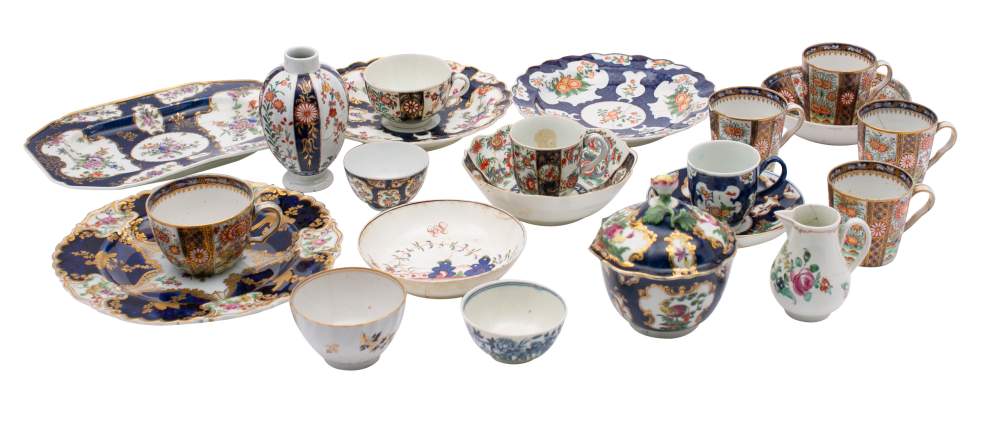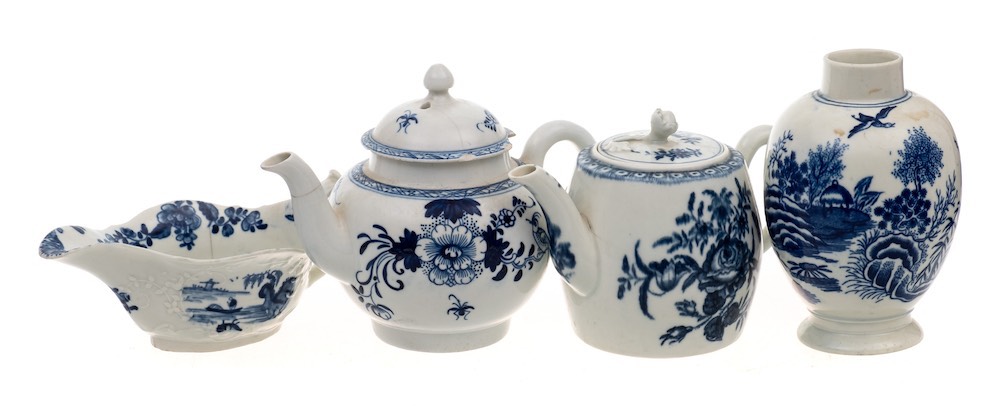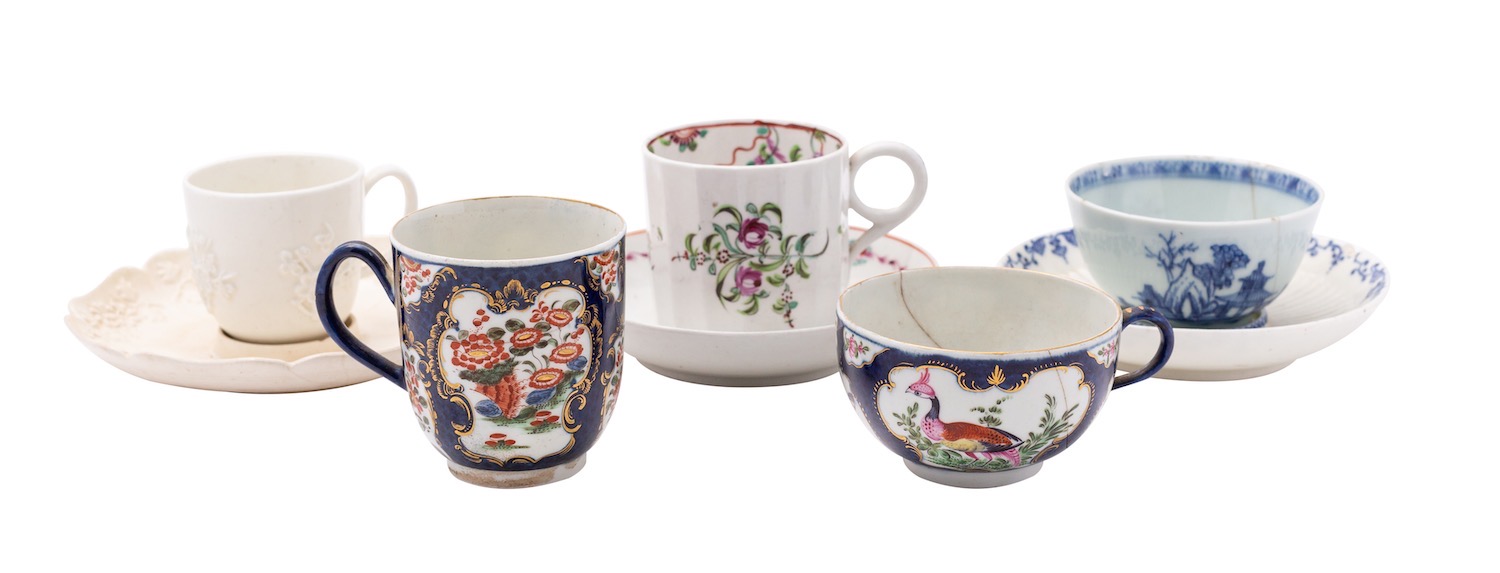Lot consists of: (A) Round poll tomahawk, 8 1/2" x 3 3/4". French and Indian War, c. 1750. French made. Nicely maker marked with "A-G" with other markings, shown in "Their Fires Are Cold", Vietzen, page 134. Believed to be made for Simon Girty's Island Trading Post on the Maumee River (Girty's Island). See 2001 correspondence. From H. Jacoby Collection. (B) Round poll tomahawk, 8" x 3 1/2". Same axe is pictured in "Their Fires Are Cold", Vietzen, page 139. He believed these marks to be from the "Tretz" family of armorers, of Innsbruck, Austria. Purchased from Jacoby in 1998; see letter. It also has an additional "JA" stamp which is believed to be for "Johnson's American" post near Albany, New York. (C) Round poll tomahawk, 8" x 4 1/4". French and Indian War trade, or earlier with flared blade. Forged iron, American made. Slightly spatulated blade, unmarked. (D) Round poll tomahawk, 7 1/4" x 3 1/2". French and Indian War. Excavated near Fort Plain, New York; Mohawk Valley area, Sprakers, New York. 1700-1760 early style without step at rear top of blade. Unmarked, so most likely American hand forged. Shows use as a hammer, which flattened the poll slightly. (E) Axe, 8" x 4 3/4". French and Indian War French trade. Slightly spatulated blade with two "Z" with dot markings. Vietzen believed it to be for Zimmerman, who made axes for the Iroquois, although this name cannot be found in any references this writer has. New books, published after Vietzen died, on makers of axes has a David Zeisberger, listed as a Moravian missionary from 1740 to 1808, perhaps supplied by his people for trade. See Neumann "Swords and Blades of the Revolution", page 273, 83.A for similar style axe of earlier period. This double mark might be to designate the axe quality. This is an early axe with no step on rear of blade, 1700-1760. (F) Round poll trade tomahawk, European battle axe style. 5" crescent blade 18th century. Shows use on poll, flattened slightly. An impressive axe. (G) Trade axe, 6 3/4" x 3". Mid 17th to mid 18th century. French biscayne style, thick blade, oval poll, teardrop eye. Dug at Wea Indian (Miami Tribe) site along Wabash River near Fort Quiatenon, near Lafayette, Indiana. Stockade and village destroyed in 1791. Dark patina. Nice maker touchmark of "F.P.". Nice, pedigreed, early axe. DRG Name Value Blade Length Various Overall Length Various Paperwork Descriptions
Lot consists of: (A) Round poll tomahawk, 8 1/2" x 3 3/4". French and Indian War, c. 1750. French made. Nicely maker marked with "A-G" with other markings, shown in "Their Fires Are Cold", Vietzen, page 134. Believed to be made for Simon Girty's Island Trading Post on the Maumee River (Girty's Island). See 2001 correspondence. From H. Jacoby Collection. (B) Round poll tomahawk, 8" x 3 1/2". Same axe is pictured in "Their Fires Are Cold", Vietzen, page 139. He believed these marks to be from the "Tretz" family of armorers, of Innsbruck, Austria. Purchased from Jacoby in 1998; see letter. It also has an additional "JA" stamp which is believed to be for "Johnson's American" post near Albany, New York. (C) Round poll tomahawk, 8" x 4 1/4". French and Indian War trade, or earlier with flared blade. Forged iron, American made. Slightly spatulated blade, unmarked. (D) Round poll tomahawk, 7 1/4" x 3 1/2". French and Indian War. Excavated near Fort Plain, New York; Mohawk Valley area, Sprakers, New York. 1700-1760 early style without step at rear top of blade. Unmarked, so most likely American hand forged. Shows use as a hammer, which flattened the poll slightly. (E) Axe, 8" x 4 3/4". French and Indian War French trade. Slightly spatulated blade with two "Z" with dot markings. Vietzen believed it to be for Zimmerman, who made axes for the Iroquois, although this name cannot be found in any references this writer has. New books, published after Vietzen died, on makers of axes has a David Zeisberger, listed as a Moravian missionary from 1740 to 1808, perhaps supplied by his people for trade. See Neumann "Swords and Blades of the Revolution", page 273, 83.A for similar style axe of earlier period. This double mark might be to designate the axe quality. This is an early axe with no step on rear of blade, 1700-1760. (F) Round poll trade tomahawk, European battle axe style. 5" crescent blade 18th century. Shows use on poll, flattened slightly. An impressive axe. (G) Trade axe, 6 3/4" x 3". Mid 17th to mid 18th century. French biscayne style, thick blade, oval poll, teardrop eye. Dug at Wea Indian (Miami Tribe) site along Wabash River near Fort Quiatenon, near Lafayette, Indiana. Stockade and village destroyed in 1791. Dark patina. Nice maker touchmark of "F.P.". Nice, pedigreed, early axe. DRG Name Value Blade Length Various Overall Length Various Paperwork Descriptions















Try LotSearch and its premium features for 7 days - without any costs!
Be notified automatically about new items in upcoming auctions.
Create an alert